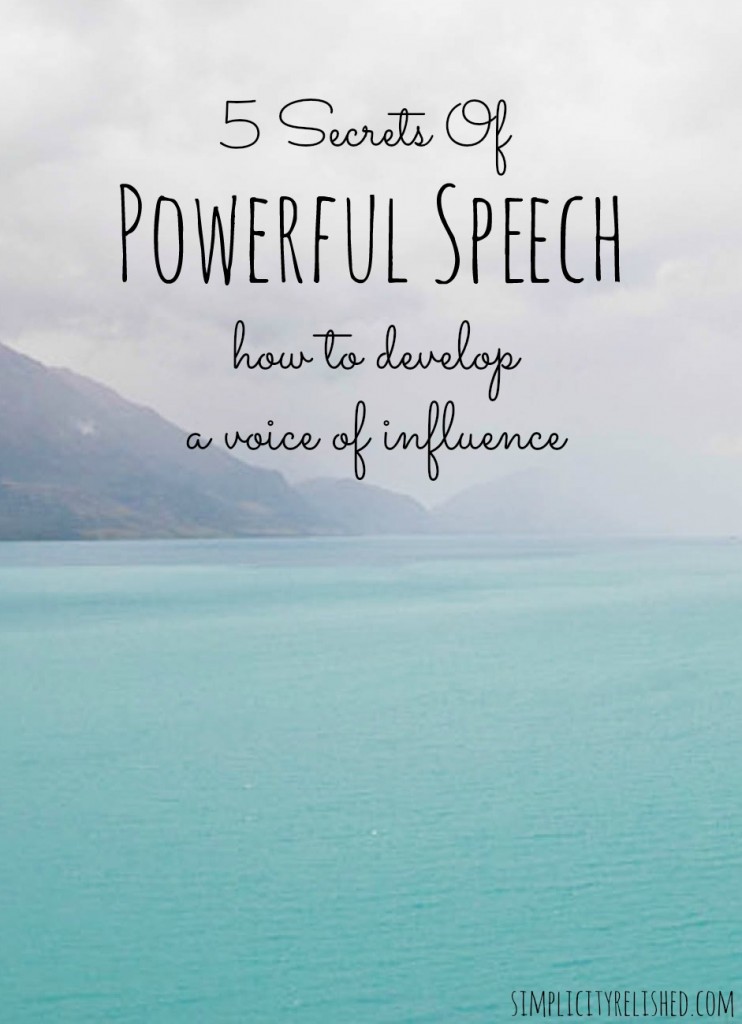Words are everywhere. We are constantly bombarded with messages, promotions, updates, advertisements and campaigns, and the majority of it will add very little value to our lives. Despite my efforts to subscribe only to useful newsletters, I can easily receive over 50 automated emails a day. The value of the word– written and spoken– is decreasing. I call it verbal inflation.
And as those voices clamor for our attention, we wrestle with our own need to be heard. Words gush out of us when we’re tired, frustrated, passionate, contemplative or even confused.
So how do we reconcile our need for verbal expression with the fact that everyone– including ourselves– experiences a verbal overload on a regular basis? How do we become powerful speakers (or writers) whose words actually matter?
Authenticity doesn’t always cut it
Genuine authenticity comes straight from the heart: it’s raw, vulnerable, insightful, and ultimately redemptive. But the “authenticity” that so often comes with the overshare, the rant or the recalcitrant refusal to change is truly the worst kind of expression.
Related: When Authenticity Becomes A Recipe For Disaster
If we seek to wield power with our words, we must think about their impact before those words are spoken. It’s easy to provoke a reaction with dramatic claims and trendy clamor at first. But recall the boy who cried wolf. In the original story, the villagers were so sick of his false alarms that they ignored his one true alarm, and he gets eaten by the wolf.
We, too, can be overrun by our worthless words if we don’t hold ourselves to a high standard. Do you want to be heard and believed? Then read on!
5 Secrets to Powerful Speech: THINK
Have you ever said (or written) something that you immediately regretted? I have, too– it seems a part of the human condition. So how can we minimize those instances?
I recently came across a brilliant acronym that I would like to expound upon. Unfortunately I don’t know the original author of this acronym, but s/he exposed the secret to powerful speech.
The following five questions are the ones to ask yourself before speaking or writing (or in any other way, expressing). They are so simple, and yet if we filtered everything we said in a day through these standards, many of us probably should have remained mute. It’s painful to realize that so much of what is written or spoken is junk; the good news is that, the less junk we put out there, the more likely people will listen to what we do say.
T: Is it true?
A basic rule-of-thumb to avoid the boy-who-cried-wolf situation is to avoid lying– especially the kind used simply to get attention. Perhaps you would never consider literally crying wolf (or perhaps yelling “Fire!” in a crowded room), but you do find yourself exaggerating the truth for dramatic effect.
There’s nothing wrong with a little embellishment for entertainment value, but a powerful speaker is one who knows how to use emphasis to the benefit of the listener. Speak what is true.
H: Is it helpful?
There are so many proven facts out there that just aren’t very helpful. Speaking powerfully requires the discernment to disseminate the truths that are helpful in the moment.
The most difficult aspect of this question is that you can’t be helpful if your goal is simply to win an argument or save your pride. In order to be helpful, you have to recognize need in the situation.
I: Is it informed?
We love to speculate, don’t we? We skim a brief article and suddenly we’re experts. We see a snapshot of a place we’ve never been to, and suddenly we’re describing it with authority.
One of the greatest things about speaking powerfully is actually taking the time to understand the subject. Those of us who received a liberal arts education often have the skills to “fly by the seat of our pants” when it comes to a discussion. But soon that house of cards will collapse, and more often than not, we’re only basing our opinions on a hunch. Better to be informed, or to admit you don’t know, if you hope to gain trust and respect from your listeners.
N: Is it necessary?
Again, we must assess and understand the need for something to be said before we say it. Sometimes under the guise of “just trying to help,” we spin webs of frivolity around a dire situation in need of anything but.
Wouldn’t you like to be the person in the room who says what actually needs to be said? Me, too.
K: Is it kind?
The ultimate test of your goodwill: given that your words are true, helpful, informed, and necessary, can you say that they are kind?
Kindness is a very difficult word to define, but we all know what it means because we’ve experienced it. Sometimes kindness means unveiling a difficult reality so that it can be addressed. Other times it means clothing those words with gentleness and compassion. After all, gentleness is the most powerful weapon we have for effecting change.
The bottom line: you’re capable of powerful speech.
Everyone is capable, but not everyone puts their words to the test. Whether you desire to write a beloved blog, to bring value and depth to your relationships, or to advocate in a compelling manner for something you care about, these five questions are absolutely necessary.
In this endless sea of words we now know as the twenty-first century– where anyone can text, tweet, email, or post– people are looking for value. Seek it. Find it. Deliver it.
[Tweet “5 Secrets to Powerful Speech: how to stand out in a sea of words via @daisylinshih”]



Brilliant post! I also find that being mindful and measured with your words helps to maintain professionalism in the workplace, both in terms of avoiding office gossip and not to over promise on what you can actually deliver 🙂 have a great weekend ahead!
Same here. Words are so powerful and this verbal inflation completely cheapens their use. It’s sad.
Thanks Emily! I sometimes wish we could add value back to the written word.
Thank you, friend! 🙂
That’s brilliant, Jill– they’ll be much wiser with their words than their peers!
Thank you, Sarah! Yes- those are good regular reminders for me.
Thank you Heather! I appreciate that!
Thank you for sharing your thoughts on this, Julie! Children pick up on more than we often realize (or give them credit for!)
Exactly! It’s important to remember the impact that we have– and to use it well!
Thank you Lora. I hope your students find this helpful!
Thanks friend! x
Thank you Anna! I think you’re wise… some subjects just don’t need everyone’s comments!
Great post Daisy! I’ve always operated by the concept of if you don’t have anything of value to say, then don’t talk. So sometimes, I may seem quiet in a group conversation, but if it’s on a topic I don’t care for, or I’m not informed about, or if I have nothing of value to add, then I just keep my mouth shut.
Well said, my friend, well said. Such great insight here, the acronym is so so smart. I’ll definitely be borrowing that and teaching it to those I know. Being mindful of our words goes a long way too I think! X
” It’s painful to realize that so much of what is written or
spoken is junk; the good news is that, the less junk we put out there,
the more likely people will listen to what we do say. ”
Yes. So true. What a great acronym, too! I will be sharing this with our youth group students.
Exactly! I love that– mindful of our words. You’re so right.
Yes, totally. Angry words can only last for so long– but it’s kindness that leads people to actually consider a different perspective and maybe make a change!
That acronym is so smart. The ones I see the least of seem to be kind and informed statements. It seems like a lot of folks have lost the ability to have a conversation where they disagree with someone’s opinions but still value that person as a human being! You’re right that words are so valuable and that acronym is such a smart way to evaluate if we’re giving words the value they deserve!
LOVE this post! I’m definitely going to keep that acronym in mind. I think being more mindful of our words is so important.
xoxo
Kat
I love, love, LOVE this post! The way you said it, verbal inflation–it’s so true. I’ve noticed this myself, and couldn’t have said it better. I’ll definitely be sharing this!
Thank you so much for your comment! Being caled a sophisticated reader definitely made my day!
The Locust Effect sounds very interesting, maybe I can get my hands on it 🙂
I like this and I love the acronym….I’ve used “is it true, necessary or kind” with my girls for a couple years now.
Thank you for this really wonderful reminder to stop and think! I especially liked your reflections on being informed and being kind 🙂
This was so necessary as everyone is trying to get a voice out there whether it’s needed or not!
Thank you for this reminder Daisy; our words really can make a huge difference! As an educator, I constantly am aware of the words I am speaking because I know any comment or word I say can have a positive or negative impact on the children I am teaching. As adults we are solely responsible for the words that come out of our mouths. I know I remember words more than anything else!
I’ve also come across this acronym before, and I think it’s a very useful guide for choosing what words to say and write. Our speech is generally more full of impact than we even realize, and that can be scary.